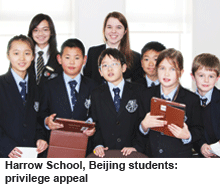Cricket, boarding-house names reminiscent of Harry Potter’s Hogwarts and ancient and peculiar customs are among the hallmarks of Britain’s leading private schools. Now they can be found in Singapore and Kazakhstan. As the domestic market softens, some of the most famous names in British education are building far-flung outposts.
 Harrow led the way in 1998 by setting up a school in Bangkok, where its straw boaters greatly amused the locals. It now has schools in Beijing and Hong Kong too. Sherborne, a private school in Dorset, has opened a branch in Qatar. From next year Wellington, a boarding school in Berkshire, will compete for Shanghai’s pupils with Dulwich, a south London day school, which already has a franchise there.
Harrow led the way in 1998 by setting up a school in Bangkok, where its straw boaters greatly amused the locals. It now has schools in Beijing and Hong Kong too. Sherborne, a private school in Dorset, has opened a branch in Qatar. From next year Wellington, a boarding school in Berkshire, will compete for Shanghai’s pupils with Dulwich, a south London day school, which already has a franchise there.
At home, private schools are criticised for perpetuating privilege. Overseas, that may be precisely the appeal. ISC, a research company, estimates that some 6,300 ‘English-style’ schools were operating overseas by 2012, up from 2,600 a decade earlier (that category includes many commercial and stand-alone outfits, some of which have been around for decades). The market is growing by 6 percent a year.
Overseas expansion creates an extra revenue stream for private schools — handy at a time of domestic austerity and falling admissions. Schools also tout their foreign branches to British parents, who increasingly want their offspring to learn about fast-growing bits of the world and, particularly, to pick up some Chinese (though in practice some offshoots of British private schools in China are so rigidly Anglophone that pupils are told off for speaking the language).
The first international schools were set up in the 19th century in countries like Japan, Turkey and Switzerland, for the families of diplomats and business travellers. British private schools were set up in India with a rather different purpose: to educate the local elite to be British gentlemen. The new rash of British schools abroad combines something of both objectives. They are designed to appeal to a mixture of globetrotting parents and ambitious locals with an eye to a university education in Europe or America for their children. Pupils tend to write the International GCSE, which some consider tougher than the standard British test, and often the International Baccalaureate.
The schools also offer a respite from traditional Asian rote learning and promote a more questioning outlook. Still, local aspirations die hard. One teacher in Hong Kong says it can be tough to persuade pupils to go home at night: some even try to sleep under their desks. In schools with a mixture of locals and foreigners, Chinese pupils tend to dominate orchestras and maths competitions.
The Dubai-based GEMS school chain, meanwhile, has cheekily reversed the trend. The outfit, run by Sunny Varkey, an Indian entrepreneur, is busy setting up new schools in Switzerland and Uganda. It is also opening a clutch of private schools in England, at cheaper prices than the established competition.
Inspiring Big Mac varsity
British universities can be depressing. the dons moan about their pay and students worry they will end up frying burgers — or jobless. Perhaps they should try visiting McDonald’s University in East Finchley, London.
Students are often “rough and ready”, with poor qualifications and low self-esteem. But ambition-igniting murals display the ladder of opportunity that leads from the grill to the corner office (McDonald’s chief executives have always started at the bottom). A map of the world shows the seven counterpart universities. Cabinets display trophies such as the Sunday Times award for being one of Britain’s best 25 employers.
McDonald’s is one of Britain’s biggest trainers. It gets about 1 million applicants a year, accepting only one in 15, and spends £40 million (Rs.219 crore) a year on training. The Finchley campus, opened by Margaret Thatcher, the then local MP, in 1989, is one of the biggest training centres in Europe — many of the classrooms are equipped with booths for interpreters. It is part of a bigger system. An employees’ web-portal, Our Lounge, provides training as well as details about that day’s shifts, and allows employees to compete against each other in work-related video games.
The focus is on practicalities. A retired policeman conducts a fast-paced class on conflict management. He shows a video of a woman driven berserk by the fact that you cannot get chicken McNuggets at breakfast time. He asks the class if they have ever had a difficult customer, and every hand goes up. Students are then urged to share their advice. (“Serve drunks quickly…”).
Self-esteem and self-management are on the syllabus, too. Steven Covey’s Seven Habits of Highly Effective People is a popular text. A year-long apprenticeship programme emphasising English and maths leads to a nationally recognised qualification. McDonald’s has paid for almost 100 people to get degrees from Manchester Metropolitan University.
The company professes to be unfazed by the fact that many alumni will end up working elsewhere. It needs to train people who might be managing a business with a £5 million turnover by their mid-20s. It also needs to satisfy the company’s appetite for senior managers, one of whom will eventually control the entire global McDonald’s empire.
(Excerpted and adapted from The Economist)



























